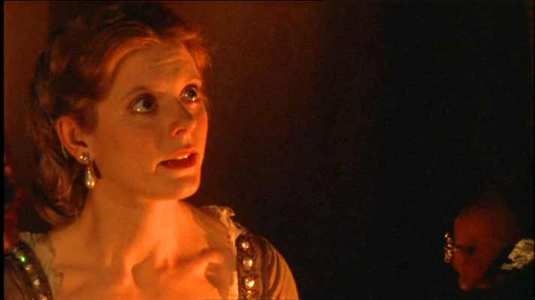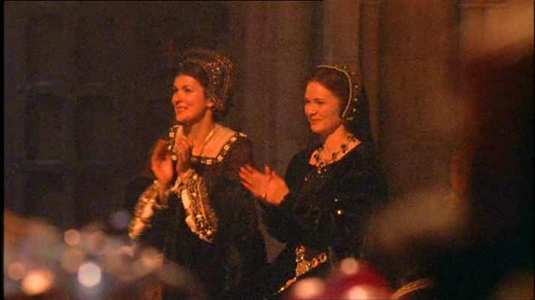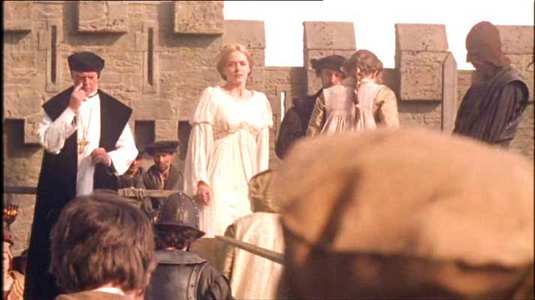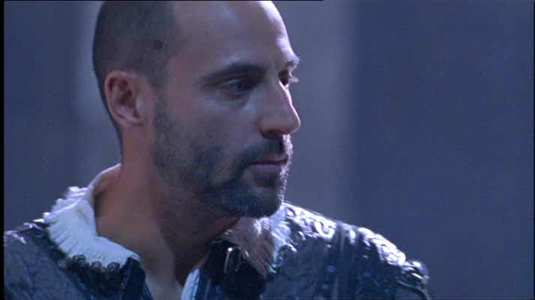Review of Henry VIII (Two Discs set)
Introduction
Late on in Pete Travis and Peter Morgan’s version of ‘Henry VIII’ (screened over two nights in October on ITV), Ray Winstone’s blustery, belligerent monarch watches a couple of dogs maul and savage one another in a pit, and it’s a fitting summation of the treacherous times of the Tudors. Like Shekhar Kapur’s dazzling ‘Elizabeth’, (which, usefully picks up right where this leaves off) ‘Henry VIII’ is fizzy with intrigue, high on its dynamics of desperate passions and flame-lit subterfuge. However, rather than a broad overview of the political tempest circling around Henry’s monstrous reign, we get a plot that marches rigorously through his six disastrous marriages in his quest to foster a male heir, capable of assuming his kingdom as it quaked from enemies overseas and within.

Video
Anamorphic widescreen that doesn’t hold up to much scrutiny, there are compression signs and the transfer shows up some of the flaws in the film-stock and the cut-price special effects.

Audio
Atmospheric, half-inched score, nicely presented in an acceptable stereo track.

Features
Junket interviews with most of the principles (presented in anamorphic widescreen), mostly dry and frivolous but revealing some interesting conceptual overviews: the filmmakers talk of exposing Henry as a “Gangster King”, the film is posited with the marketing-friendly tagline “the Sopranos meets the Tudors.” Director Pete Travis offers convenient sound-bites, always finding time to slip a buzz-friendly “sexy” into every sentence. Winstone’s interview is “Uncut”, and no, this doesn’t mean he f’s and blind’s his way through the set, but instead there are broken microphones and an obsessive, no doubt unconscious nose-scratching to punctuate his seemingly stoned ramblings. It adds up to about 50 minutes in total, but it feels like a scrappy addition. More thought, and certainly more hindsight from the original broadcast would no doubt have allowed for some deeper, more thorough supplements.

Conclusion
I’ll leave the minutiae of historical fact-squabbling to the scholars and their wannabes and say simply that in regards to the history of filmed biopics, ‘Henry VIII’ is fairly traditional, its modern twists adding only a few surface tweaks to the mythology of Henry’s reign. The film redirects the focus of history somewhat, giving Henry rudimentary reasons for the disposal of his wives, offering a rather too trimly psychologized version of a man corrupted by power and pushed into madness by psychic demons (Henry’s assembled motivations don’t quite add up persuasively.) The aesthetic is modern frippery for the most part: slow-motion dissolves, hand-held cameras, pathological use of the close-up and the ‘moody’ tracking of a camera through an under-lit echoing set to a licensed score, borrowing atmosphere as the messy direction, compromised through budgetary restrictions, lunges artlessly to keep up. Occasionally things even stumble into self-parody as characters seem condemned to constantly re-emerge from enveloping shadows to deliver further treasonous whispers.
So, if the production, snatching grubby handfuls of artistic “inspiration” from ‘Gladiator’ and ‘Elizabeth’, has a bit too much of the second-hand populist veneer of the ITV special it ultimately is, a quirky collection of performances and a compulsive, no frills narrative make it staunchly compelling. Helena Bonham Carter makes for a sympathetic Anne Boleyn, although her mannerisms and delivery are perhaps an octave too modern. Winstone makes for a brooding, haunted Henry, although the plot’s episodic contortions push him towards trademark histrionics. At several moments of key emotional despair, Winstone looks like he’s about to dramatically revert to type, flip a few pool-balls in a tube-sock, clock those who vex him firmly on their disobedient craniums and spit, curling raging ventricles of saliva around every vowel: “I’m the Daddy Now…” The painful fact is, and however involving a piece of stunt-casting it may be, that Winstone is simply too fine a kitchen-sink Heavy with a quivering inferno of elemental fury ever lurking behind those black eyes of twitching empathy. He’s a King alright, but not of treacherous, divided 16th Century Britain, but King Thug of patriarchal, doom-laden social-realist drama.
Peripheral characters also impress: Daniel Webb is well cast as insidious political salamander Cromwell; and as Katherine Howard, Henry’s unfortunate 5th, Emily Blunt has a youthful vivacity reminiscent of a young Kate Winslet. Whilst the episodic quality of the narrative opens the film up to accusations of repetition and superficiality, sly cameos from Sean Bean and Joss Ackland add a human anchor to a slim, pop-up fact narrative skeleton. So, whilst the nippy, expository plot is suitably engaging, the film lacks a solid identity. The aesthetic is too banal to capture the essence of the polarized emotions on display: sensations cast only in extremes, passionate, consuming love or beastly betrayals, not to mention the labyrinthine political deceit the film wrestles to coax into relevance. Indeed, the fact that the film ends with a pompous voice-over epilogue reminds us how much this workmanlike docu-drama gets lost scrambling to contemporize the past.
Your Opinions and Comments
Be the first to post a comment!